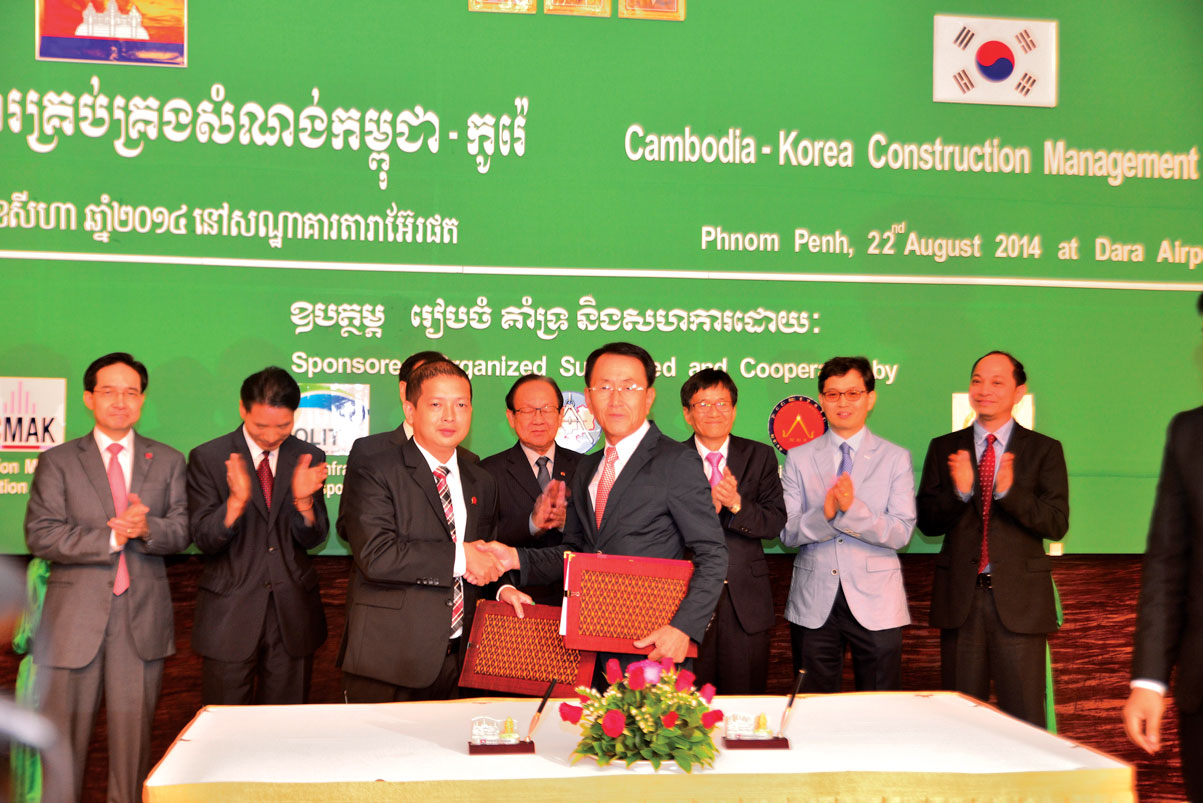Korea Introduces Construction Management
Cambodia has been applauded for double-digit growth on construction projects over the last three years. Investment in construction projects soared 46% from 2010 with 2,125 projects worth $1.2 billion to 1,641 projects worth $2.1 billion in 2011. 2012 saw an increase of 72% over 2011 to 1,694 projects worth $2.8 billion, with 2013 seeing 31% growth compared to 2012.
In the first five months of this year, the government recorded 728 projects with estimated total value of $1.5 billion, marking a 210% increase against the same period in 2013.
But amid this construction boom, very few projects apply construction management, a little known technical service in Cambodia that is linked to construction quality and cost, and which has been highly productive elsewhere.
Construction management (CM) is the overall planning, coordination and control of a project from beginning to completion. CM aims to meet a client’s requirements in order to produce a functionally and financially viable project. Construction experts agree that using proper construction management can save construction projects cost, time, ensure quality, and safety, especially when integrating construction risk management.
Seeing the gap in the market, the Construction Management Association of Korea (CMAK), a Korean-private constructors group established in 1997 and with almost 200 members, has been exploring the potential for introducing the service to Cambodia since 2010. After their market research, CMAK signed an MoU with the Ministry of Land Management, Urban Planning and Construction (MLMUPC) in June 2012.
The agreement, which is funded by the South Korean government, aims to help prepare a construction code so as to bring construction management services to Cambodia. They have been working on a 2-year project in Cambodia conducting research related to construction management and the construction law, and transferring knowledge to Cambodian professionals about the services. The project is scheduled to be completed in June next year.
“With the application of construction management services in Cambodia, it will ensure construction projects in this country will prosper healthily,” said Yung-HwiBae, CMAK Chairman at the “Cambodia-Korea Construction Management Conference” hosted in Phnom Penh on 22 August.
Construction management implementation introduced by CMAK is a new subject for Cambodia’s construction for both the public and private sectors. To pave the way for the industry, Olympia City Development Co., Ltd, the developer of the $250 million Olympia City development project, implemented a CM pilot project with Korean firm Shin Hwa Engineering in March 2013. After realizing the benefits it gained Olympia has renewed the contract for another 30 months.
“We have conducted the construction management pilot project with this Korean company, and we have realized that the service can benefit us a lot regarding construction quality and cost, so we decided to extend the contract to another 30 months,” sad Touch Samnang, Deputy Director of the Overseas Cambodian Investment Corporation (OCIC), the parent developer of Olympia City development.
While the service has potential and use for construction projects in Cambodia, Professor Hyun Soo Lee of College of Engineering, Seoul National University said it is very hard to apply South Korean construction methods here since Cambodia doesn’t yet have a well-organized construction law.
Cambodian officials admit the difficulties. H.E. Im Chhun Lim, Minister of MLMUPC thanked CMAK for the framework that has assisted the ministry to prepare legal regulations such as a construction law and a draft proclamation of construction work management used as inputs in the land management, urban planning and construction law.
The proclamation is to ensure that construction management implementation from beginning to end proceeds efficiently in accordance to the needs of project owners and to make sure that construction work finishes on time with guaranteed quality and security to the planned budget. The law has been drafted and requires further discussion among relevant stakeholders. The proclamation will apply to large projects but will not include foreign-aid funded projects.
The ministry has also been cooperating with U.K. developing partners to establish building standards for Cambodia. It has also signed an MoU with the Cambodia Constructors Association (CCA) to exchange experience, technology, and information in the construction industry.
Despite the government having enacted various laws and regulations as the basis for construction management and controls, H.E. Huy Nara, General Director of the General Department of Construction, MLMUPC worries that those laws and regulations have not yet met the current demands of the construction sector’s growth. The ministry has been actively revising existing laws and regulations in response to current construction demands, he added.
“Construction Management in Cambodia demands the development of laws, regulations and setting relevant policy to suit the current construction status, as well as the sharing of technology through new research and training,” he said.
H.E. Huy Nara also added that Cambodia is currently drafting the “Land Management Urban Planning and Construction Law” led by government advisor H.E. Dr. Sok Siphana, with the participation of expert officials. He hoped it would be finished by the end of this year.
The law will define duties and obligations of parties, construction technical preparation, construction business management, dispute resolution, and define fault and illegality.
Mr. Charles Vann, Acting Chairman of CCA, has also signed an MoU with CMAK and points out that despite admiring the capital’s rapidly changing skyline, full growth potential in the construction sector has not yet been realized due to limited construction management competence and expertise.
“We are aware that there is a need to learn more and adopt from other progressive countries like Korea…,” he said, adding that, “We fervently hope that after this construction regulation is officially issued and the standard is widely practiced, construction projects in Cambodia will be improved as well.”
- Video Advertisement -



 ខ្មែរ
ខ្មែរ







